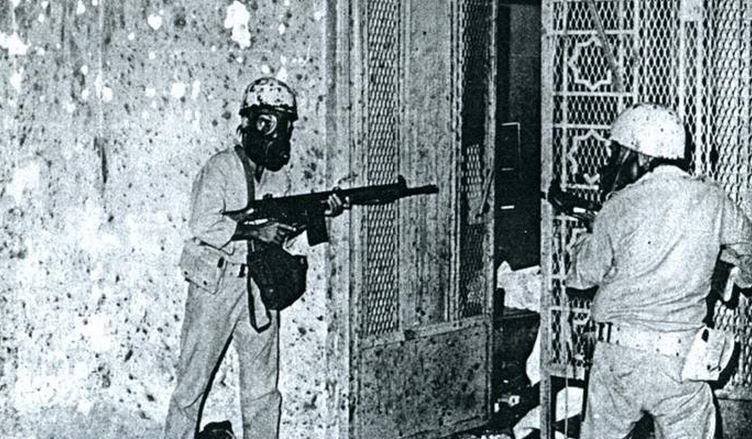November 20, 2019
Forty years ago today, dozens of bearded gunmen stormed the holiest site in Islam, the Grand Mosque at Mecca, in Saudi Arabia.
They held the complex for two weeksbefore a French-trained Saudi force rooted them out, but the fallout from the attack went on to shape the modern Middle East in ways that are still with us today: in the scourge of transnational jihadism and the deepening rivalry between Saudi Arabia and Iran.
It's worth recalling the backdrop in November 1979. Cairo had recently allied itself with the US and made a controversial peace deal with Israel at Camp David that would later lead to Egyptian president Anwar Sadat's assassination. The Iranian revolution had just brought to power a Shiite Islamic theocracy that was immediately a political and sectarian rival to the Saudis. The godless Soviets were mulling their fateful invasion of Afghanistan.
And several years earlier, the Saudi King himself had been assassinated by an extremist relative who resented his introduction of television to the kingdom.
The gunmen who took the mosque at Mecca were of a similar mindset. Their leader, Juhayman ("the scowler") el-Oteibi, was a homegrown Saudi religious fanatic who believed – as did many of the kingdom's clerics, in fact – that Saudi Arabia's rapid, oil-fueled modernization of the 1970s had caused it to stray from strict Islamic ideals: Too many women in the workforce. Too much TV. Too many foreigners. Too many Saudi princes carrying on in Monaco.
Stung by Iran's external challenge to its legitimacy and Juhayman's internal one, Saudi Arabia radically changed course: it rolled back all social liberalization, imposing the clerical establishment's strict wahhabi interpretation of Islam at home, and aggressively exporting it abroad.
Saudi Arabia's rulers made this bargain in part because they thought it would head off the growth of anti-government extremism in the Kingdom. And in part because, fearful of Iran's rise, it made sense to double down on extreme Islamic piety in the face of a nearby theocratic rival.
There are three things happening today that flow directly from all of this:
First, today's transnational jihadism was hugely inspired by Juhayman's attack – the first spectacular jihadist operation of its scale in the modern world – and by the ultra-conservative ideology that motivated it. Meanwhile, Saudi Arabia's funding of Wahhabism around the globe helped nurture much larger transnational jihad networks like Al-Qaeda and ISIS.
Second, Saudi Arabia is only now undoing the legacy of 1979: Crown Prince Mohamed bin Salman, the de facto ruler of the kingdom today, has framed his tightly controlled experiments in social liberalization as an attempt to put the country back on its pre-1979 course.
Lastly, it crystallized the Iran-Saudi rivalry that continues to cut across the region today. As Wall Street Journal correspondent Yaroslav Trofimov, who quite literally wrote the book on the Siege of Mecca, explained to us, the one thing that the House of Saud, the clerics, and the Juhayman types could all agree on was that Iran, as a Shiite power, was a heretical danger that must be confronted. Now, forty years later, even as Saudi Arabia carefully liberalizes at home, the rivalry with Iran is as fierce and dangerous as ever.
More For You
As expected, the Supreme Court struck down the bulk of Donald Trump's sweeping “Liberation Day” tariffs as illegal … and almost nothing changed.
Most Popular
What's Good Wednesdays
What’s Good Wednesdays™, February 25, 2026
Sponsored posts
Small businesses at a crossroads
Chris, an Army veteran, started his Walmart journey over 25 years ago as an hourly associate. Today, he manages a Distribution Center and serves as a mentor, helping others navigate their own paths to success. At Walmart, associates have the opportunity to take advantage of the pathways, perks, and pay that come with the job — with or without a college degree. In fact, more than 75% of Walmart management started as hourly associates. Learn more about how over 130,000 associates were promoted into roles of greater responsibility and higher pay in FY25.
Ukraine's President Volodymyr Zelenskiy, Finland's President Alexander Stubb, Estonia’s Prime Minister, President of the European Commission Ursula von der Leyen and other European leaders visit memorial to fallen Ukrainian defenders at the Independent Square on the fourth anniversary of Russia's full-scale invasion, in Kyiv, Ukraine February 24, 2026.
Ukrainian Presidential Press Service/Handout via REUTERS
Somewhere in the Donbas region, Ukrainian soldier Artem Bondarenko says he hasn’t slept through the night in months as he defends Eastern Ukraine.
- YouTube
In the latest episode of Vladimir Putin and Xi Jinping's hit wellness podcast This Authoritarian Life, we learn how positive communication patterns can break negative cycles in our relationships -- especially our relationships with Iran, Syria, Venezuela, and Cuba. #PUPPETREGIME
© 2025 GZERO Media. All Rights Reserved | A Eurasia Group media company.
